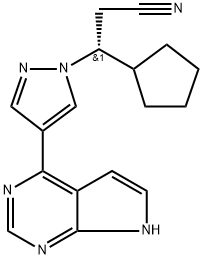Janus-associated kinases (JAKs) are cytoplasmic tyrosine kinases that are required for activating the signaling of certain cytokines and growth factor receptors. A JAK2 gene fusion mutation, JAK2V617F, that causes unchecked activation of various growth factors and cytokines, has been linked to myeloproliferative neoplasms (MPNs), including polycythemia vera, essential thrombocythemia, and primary myelofibrosis. Ruxolitinib is a potent ATP mimetic that inhibits both JAK1 and JAK2 with IC50 values of 2.7 and 4.5 nM, respectively and is relatively less selective for JAK3 (IC50 = 322 nM). It can block interleukin-6 (IL-6) signaling (IC50 = 281 nM) and proliferation of JAK2V617F+ Ba/F3 cells (IC50 = 127 nM). In primary cultures, ruxolitinib preferentially suppresses erythroid progenitor colony formation from JAK2V617F+ polycythemia vera patients (IC50 = 67 nM) versus healthy donors (IC50 > 400 nM). In a mouse model of JAK2V617F+ MPN, 90 mg/kg ruxolitinib reduced splenomegaly, decreased circulating levels of IL-6 and TNF-α, eliminated neoplastic cells, and prolonged survival of the treated animals.

